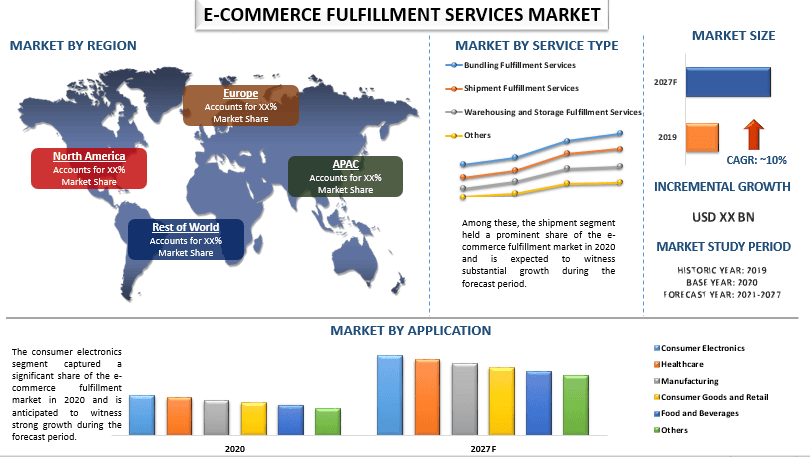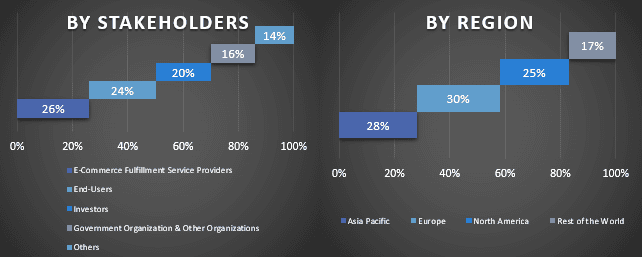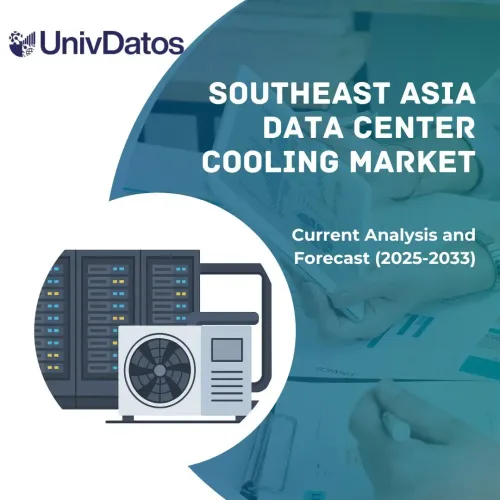- Home
- About Us
- Industry
- Services
- Reading
- Contact Us
E-Commerce Fulfillment Services Market: Current Analysis and Forecast (2021-2027)
Emphasis on Service Type (Bundling Fulfillment Services, Shipment Fulfillment Services, Warehousing and Storage Fulfillment Services, and Others); Application (Consumer Electronics, Healthcare, Manufacturing, Consumer Goods and Retail, Food and Beverages, and Others); and Region/Country

The global e-commerce fulfillment services market is expected to register a CAGR of around 10% over the period of 2021-2027. The global e-commerce fulfillment services market is uplifting on account of the proliferation of e-commerce, increasing smartphone and internet penetration, and developments in the electronics industry. Moreover, the rising disposable income followed by the advancements in the e-commerce industry is positively stimulating the industry landscape. E-commerce fulfillment is the entire process of delivering an order after a customer place an order online. This part of the supply chain includes receiving and storing inventory, processing orders, picking items, packing boxes, and shipping items to the destinations of customers. The e-commerce industry is one of the most prominent factors driving the growth of this market all over the world. For instance, according to the Census Bureau of the U.S. Department of Commerce, the U.S. retail e-commerce sales for the first quarter of 2022, adjusted for seasonal variation, but not for price changes, was $250.0 billion, an increase of around 2.4 percent from the fourth quarter of 2021. Therefore, the e-commerce fulfillment services market is expected to witness growth.
Amazon.com Inc., eFulfillment Service Inc., Ingram Micro Inc., Rakuten Inc., Red Stag Fulfillment LLC, ShipBob Inc., Shipfusion Inc., FedEx Corporation, United Parcel Service of America Inc., and Nolan Transportation Group LLC are some of the key players in the market. Several M&As along with partnerships have been undertaken by these players to facilitate customers with hi-tech and innovative products/technologies.
Insights Presented in the Report
“Amongst service types, the shipment fulfillment services segment held a prominent share in the market in 2020”
On the basis of service type, the market is segmented into bundling fulfillment services, shipment fulfillment services, warehousing and storage fulfillment services, and others. Among these, the shipment fulfillment services segment captured a significant share of the e-commerce fulfillment services market in 2020 and is expected to witness robust growth during the forecast period. This is mainly due to the trade relaxation policies and cross-border shipment agreements between countries. For instance, India and Australia signed the Australia-India Comprehensive Economic Cooperation Agreement (AI-CECA) in April 2022, the aim of this agreement is to improve the trade between the two countries which stood at USD 24.3 Bn in 2020.
“Amongst applications, consumer electronics captured a prominent share in the market in 2020”
Based on application, the market is categorized into consumer electronics, healthcare, manufacturing, consumer goods and retail, food and beverages, and others. Consumer electronics accounted for a commendable share of the e-commerce fulfillment services market in 2020 and is anticipated to witness substantial growth during the forecast period owing to the increasing demand for consumer electronics coupled with the need for careful handling of fragile electronics products and gadgets.
“APAC to witness significant growth during the forecast period”
APAC accounted for a significant share of the global e-commerce fulfillment services market and is expected to grow at a steady growth rate during the forecast period. This can be attributed to the rising internet penetration rate and growing demand for consumer electronics in the region. Further on, the growing e-commerce and consumer electronics industries are playing a significant role in the growth of the regional market. For instance, according to IBEF, the Indian appliances and consumer electronics industry stood at USD 9.84 Bn in 2021 and is expected to more than double to reach USD 21.18 Bn by 2025.
Reasons to buy this report:
- The study includes market sizing and forecasting analysis validated by authenticated key industry experts.
- The report presents a quick review of overall industry performance at one glance.
- The report covers an in-depth analysis of prominent industry peers with a primary focus on key business financials, product portfolio, expansion strategies, and recent developments.
- Detailed examination of drivers, restraints, key trends, and opportunities prevailing in the industry.
- The study comprehensively covers the market across different segments.
- Deep dive regional level analysis of the industry.
Customization Options:
The global e-commerce fulfillment services market can further be customized as per the requirement or any other market segment. Besides this, UMI understands that you may have your own business needs, hence feel free to connect with us to get a report that completely suits your requirements.
Table of Content
Research Methodology for the E-Commerce Fulfillment Services Market Analysis (2021-2027)
Analyzing the historical market, estimation of the current market, and forecasting the future market of the global e-commerce fulfillment services market were the three major steps undertaken to create and analyze the adoption of e-commerce fulfillment services in major regions globally. Exhaustive secondary research was conducted to collect the historical market numbers and estimate the current market size. Secondly, to validate these insights, numerous findings and assumptions were taken into consideration. Moreover, exhaustive primary interviews were also conducted, with industry experts across the value chain of the global e-commerce fulfillment services market. Post assumption and validation of market numbers through primary interviews, we employed a top-down/bottom-up approach to forecasting the complete market size. Thereafter, market breakdown and data triangulation methods were adopted to estimate and analyze the market size of segments and sub-segments of the industry pertains to. Detailed methodology is explained below:
Analysis of Historical Market Size
Step 1: In-Depth Study of Secondary Sources:
Detail secondary study was conducted to obtain the historical market size of the e-commerce fulfillment services market through company internal sources such as annual reports & financial statements, performance presentations, press releases, etc., and external sources including journals, news & articles, government publications, competitor publications, sector reports, third-party database, and other credible publications.
Step 2: Market Segmentation:
After obtaining the historical market size of the e-commerce fulfillment services market, we conducted a detailed secondary analysis to gather historical market insights and share for different segments & sub-segments for major regions. Major segments included in the report as the service type and application. Further country-level analyses were conducted to evaluate the overall adoption of testing models in that region.
Step 3: Factor Analysis:
After acquiring the historical market size of different segments and sub-segments, we conducted a detailed factor analysis to estimate the current market size of the e-commerce fulfillment services market. Further, we conducted factor analysis using dependent and independent variables such as various service type and application of e-commerce fulfillment services. A thorough analysis was conducted for demand and supply-side scenarios considering top partnerships, mergers and acquisitions, business expansion, and product launches in the e-commerce fulfillment services market sector across the globe.
Current Market Size Estimate & Forecast
Current Market Sizing: Based on actionable insights from the above 3 steps, we arrived at the current market size, key players in the global e-commerce fulfillment services market, and market shares of the segments. All the required percentage shares split, and market breakdowns were determined using the above-mentioned secondary approach and were verified through primary interviews.
Estimation & Forecasting: For market estimation and forecast, weights were assigned to different factors including drivers & trends, restraints, and opportunities available for the stakeholders. After analyzing these factors, relevant forecasting techniques i.e., the top-down/bottom-up approach were applied to arrive at the market forecast for 2027 for different segments and sub-segments across the major markets globally. The research methodology adopted to estimate the market size encompasses:
- The industry’s market size, in terms of revenue (USD) and the adoption rate of the e-commerce fulfillment services market across the major markets domestically
- All percentage shares, splits, and breakdowns of market segments and sub-segments
- Key players in the global e-commerce fulfillment services market in terms of solutions offered. Also, the growth strategies adopted by these players to compete in the fast-growing market
Market Size and Share Validation
Primary Research: In-depth interviews were conducted with the Key Opinion Leaders (KOLs) including Top Level Executives (CXO/VPs, Sales Head, Marketing Head, Operational Head, Regional Head, Country Head, etc.) across major regions. Primary research findings were then summarized, and statistical analysis was performed to prove the stated hypothesis. Inputs from primary research were consolidated with secondary findings, hence turning information into actionable insights.
Split of Primary Participants in Different Regions

Market Engineering
Data triangulation technique was employed to complete the overall market estimation and to arrive at precise statistical numbers for each segment and sub-segment of the global e-commerce fulfillment services market. Data was split into several segments & sub-segments post studying various parameters and trends in the areas of the service type and application in the global e-commerce fulfillment services market.
The main objective of the global e-commerce fulfillment Services Market Study
The current & future market trends of the global e-commerce fulfillment services market were pinpointed in the study. Investors can gain strategic insights to base their discretion for investments from the qualitative and quantitative analysis performed in the study. Current and future market trends were determined the overall attractiveness of the market at a regional level, providing a platform for the industrial participant to exploit the untapped market to benefit as a first-mover advantage. Other quantitative goals of the studies include:
- Analyze the current and forecast market size of the e-commerce fulfillment services market in terms of Value (USD). Also, analyze the current and forecast market size of different segments and sub-segments
- Segments in the study include areas of service type and application
- Define and analysis of the regulatory framework for the e-commerce fulfillment services market industry
- Analyze the value chain involved with the presence of various intermediaries, along with analyzing customer and competitor behaviors of the industry
- Analyze the current and forecast market size of the e-commerce fulfillment services market for the major region
- Major countries of regions studied in the report include Asia Pacific, Europe, North America, and the Rest of the World
- Company profiles of the e-commerce fulfillment services market and the growth strategies adopted by the market players to sustain in the fast-growing market
- Deep dive regional level analysis of the industry
Related Reports
Customers who bought this item also bought










